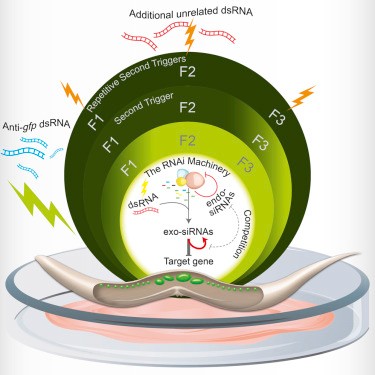Cell: Scientists discover the key switch of "memory" inheritance
Epigenetics is a concept corresponding to genetics, which refers to changes in gene expression levels based on non-gene sequence changes, including DNA methylation, chromatin conformational changes, genomic imprinting, and the like.
In the past, studies targeting people who survived traumatic accidents found that stress and trauma trigger changes in gene expression patterns that are passed on to offspring and have similar effects. But how does this apparent "memory" inherit?
On March 24th, a research team from the School of Life Sciences at the University of Chelsea, Tel Aviv published a new paper in the journal Cell, which reveals the key mechanisms by which nematodes can be inherited, and confirms this. Changes will continue to steadily between generations.
Small-molecule RNA, the "switch" that determines whether epigenetics can be extended from generation to generation.
The genetic pattern of gene expression changes has been considered to be in a passive decaying and regressive state. However, the latest research results confirm that the gene expression changes of nematodes will be stably inherited between generations.
The team led by Professor Oded Rechavi has been working on how stress, trauma and other external influence factors are stably inherited to future generations. The team has confirmed that small RNAs that regulate gene expression are key factors involved in the genetic changes of gene expression levels.
Rechavi explained that previous studies have shown that nematodes that are hunger- and virus-infected will pass on small-molecule RNA with environmentally-induced changes in gene expression to the next generation, making the next generation of nematodes experiencing the same pain. Moreover, this inheritance will be amplified, so this epigenetic change will not fade with the continuation of generations. They found that the RdRPs enzyme is a key enzyme in the synthesis of small RNAs, ensuring genetic stability.

By combining these specific small RNAs with green fluorescent proteins and reporter genes, the researchers found that these genetic mechanisms can be artificially turned on or off, that is, the interaction between small RNAs will in turn regulate genetic switches. The key gene MOTEK (Modified Transgenerational Epigenetic Kinetics) is an essential gene for small RNA synthesis and inheritance.
The feedback regulation of small RNAs determines whether epigenetic memory will continue to pass to the next generation and how long this transmission can last.
A brand new genetic theory?
Although the above conclusions are based on the results of research on nematodes as model animals, the researchers believe that this helps to deepen the understanding of epigenetics and is to establish a table using all organisms including humans. The key to the theory of genetics.
Next, the research team will study how the MOTEK gene affects the duration of epigenetic effects. At the same time, and explore whether humans also have similar regulatory mechanisms.
Shandong Longze Mechanical Equipment Co.,Ltd , https://www.pelletmachinefactory.com